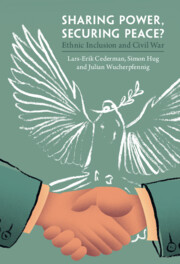Book contents
- Frontmatter
- Contents
- Figures
- Tables
- Preface
- 1 Introduction
- Part I Theories and Concepts
- Part II Analyzing the Effect of Power Sharing on CivilWar
- 4 Power Sharing and Civil War: Data and Baseline Models
- 5 Contrasting Formal Power-Sharing Institutions and Practices
- 6 Endogenizing Governmental Power Sharing and Its Effect on Civil War
- 7 The Strategic Logic of Governmental Power Sharing and Civil War
- 8 The Effect of Territorial and Governmental Power Sharing on Civil War
- 9 The Strategic Logic of Territorial Power Sharing, Secession and Civil War
- Part III Power Sharing and Civil War in Time and Space
- Bibliography
- Index
9 - The Strategic Logic of Territorial Power Sharing, Secession and Civil War
from Part II - Analyzing the Effect of Power Sharing on CivilWar
Published online by Cambridge University Press: 23 June 2022
- Frontmatter
- Contents
- Figures
- Tables
- Preface
- 1 Introduction
- Part I Theories and Concepts
- Part II Analyzing the Effect of Power Sharing on CivilWar
- 4 Power Sharing and Civil War: Data and Baseline Models
- 5 Contrasting Formal Power-Sharing Institutions and Practices
- 6 Endogenizing Governmental Power Sharing and Its Effect on Civil War
- 7 The Strategic Logic of Governmental Power Sharing and Civil War
- 8 The Effect of Territorial and Governmental Power Sharing on Civil War
- 9 The Strategic Logic of Territorial Power Sharing, Secession and Civil War
- Part III Power Sharing and Civil War in Time and Space
- Bibliography
- Index
Summary
Focusing on regional autonomy arrangements, this chapter investigates, to what extent, and in what form, territorial power sharing mitigates civil conflict (see Master Hypothesis 1b). Our point of departure is again our past research indicating that exclusion of ethnic groups increases the risk of internal conflict. As argued in Chapter 3, however, such results do not automatically imply that regional inclusiveness will guarantee peace, especially if the relationship between an excluded group and the incumbent government has already seen violence. Based on a global sample of ethnic groups as provided by the Ethnic Power Relations dataset, here we show that, in such situations and on its own, regional autonomy is likely to be ``too little, too late.'' It is too little because only full inclusion through governmental power sharing reduces conflict propensity significantly (see Master Hypothesis 5); and it is too late since regional autonomy could be effective, but only if offered in a timely, preventive fashion before group-government relations turn violent (see Master Hypothesis 3). Accounting for endogeneity, we also instrument for autonomy in postcolonial states by exploiting that French, as opposed to British, colonial rule rarely relied on decentralized governance. This identification strategy suggests that naïve analysis tends to underestimate the pacifying influence of decentralization.
Keywords
- Type
- Chapter
- Information
- Sharing Power, Securing Peace?Ethnic Inclusion and Civil War, pp. 174 - 206Publisher: Cambridge University PressPrint publication year: 2022

